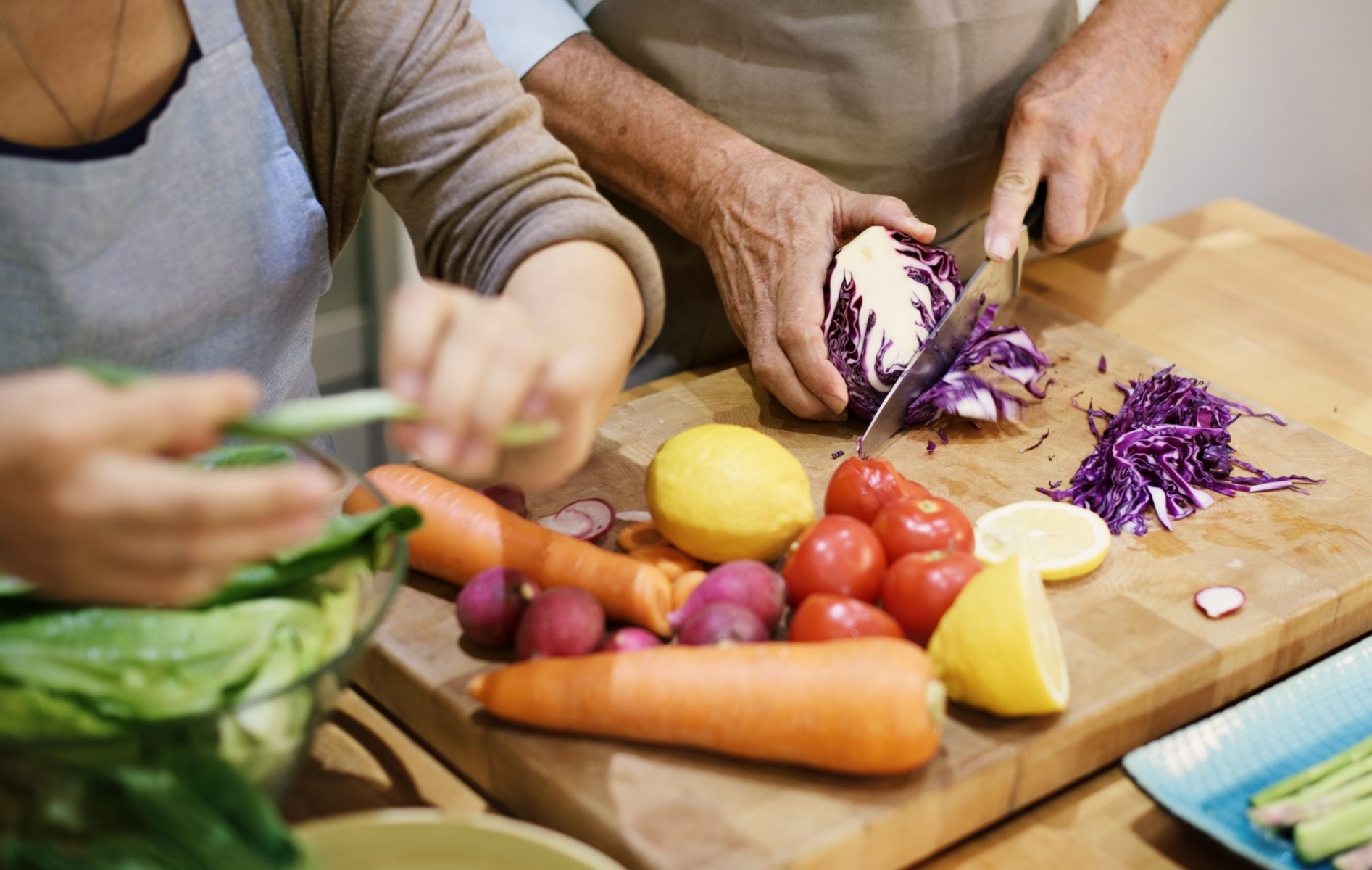Eating nutritiously is important at every age, but it becomes even more so as we age.
Not only does a healthy diet help to improve mental function, lift energy levels, and boost resistance to illness, it can also help maintain a positive outlook and even improve mental health. What’s more, eating a healthy diet doesn’t need to mean sacrifice and deprivation. You can eat nutritious and delicious food without sacrificing flavor. Read on for tips to help your senior loved one eat a healthy, balanced diet – and improve his or her mental, emotional, and physical wellbeing.
First, let’s take a look at what actually goes into eating healthfully.
Shopping with others
In order to eat healthy meals, your senior loved one needs to have healthy food available in his or her home. If your loved one is unable to drive or take public transportation to the grocery store, a family member or caregiver could either do the shopping or provide transportation and accompany your loved one to the store. If you’re shopping with your loved one, this can also provide a chance for much-needed social interaction and bonding time.
Cooking with loved ones
If cooking is something your senior loved one enjoys, but is no longer able to do for him or herself, helping out with meal preparation yourself or hiring a kindhearted caregiver can help bring that experience back into your loved one’s life. With the help of in-home senior care, your loved one doesn’t have to give up something that has always brought joy into their life.
Eating with others
Your love one may also be missing preparing and eating meals with family and friends. If it’s safe to have a friend or small family group over, you or a caregiver could assist your loved one with preparing and serving a meal. You could even set up a Zoom or other video conference so that your loved one can have a virtual meal with others.
Whatever your senior loved one’s nutrition needs, home healthcare can help make life easier.
Next, let’s take a look at what types of foods make up a healthy diet and where you can find the best sources of each one.
Fruits and vegetables
These days, it’s easy to find a wide variety of fruits and vegetables to please any palate. From brightly colored berries, to a wide array of apples to dark, leafy greens, you’re sure to find something to please even the choosiest eater. The goal is two to three servings a day, which isn’t hard to meet. Here are some ideas to incorporate more fruits and vegetables into any diet.
- Include fruit or vegetable juices but check the label to make sure they contain one hundred percent juice.
- You can make vegetables more creative and appetizing by adding olive oil, sprinkling them with cheese, or frying them with garlic or chili flakes.
- Fruit and vegetable smoothies are both fun to make and delicious. Try adding spinach or kale, along with Greek yogurt, honey, and berries.
Calcium
Calcium is vital for bone health, particularly as we age. Calcium can be found in dairy products such as milk, yogurt, and cheese, as well as plant products, including tofu, broccoli, almonds, and kale. A calcium supplement may also be a good idea, but be sure to check with your doctor first, as supplements aren’t right for everyone.
Protein
Protein is used to make enzymes, hormones, and other body chemicals, and vital for building and repairing bodily tissue. In addition, our immune system needs protein to protect us from illness. Clearly, protein is vital for overall health, but it’s also important for brain health in particular. Keep in mind that it’s important to eat a variety of protein from different sources. In addition to red meat, poultry, and seafood, protein can be found in beans, legumes, eggs, nuts, and seeds.
Fiber
You’ve probably heard that dietary fiber is vital for regularity, but did you know that it can also lower your risk for stroke, diabetes, and heart disease, improve skin health, and even help you lose weight? As we age, it’s normal for digestion to become less efficient, which is why it’s important to include enough fiber in a healthy diet. Women over the age of fifty should try to eat at least twenty-one grams of fiber per day, while men over the age of fifty need at least thirty grams per day.
Foods high in fiber include:
- Fruit and vegetables, particularly berries, prunes, pears, and peas
- Whole grains such as oats, barley, bran, and popcorn
- Legumes and seeds, including black beans, bakes beans, and almonds
Eating healthfully boosts physical, mental, and emotional wellbeing. With so many benefits available simply from eating well, it’s important to make sure our senior loved ones are doing just that.
Additional resources for nutrition information and further reading:
